More than one in five adults says their sleep problems started after beginning a new medication. It’s not just stress or screen time-it’s the pills you’re taking every day. From antidepressants to blood pressure meds, even over-the-counter cold remedies, many common drugs quietly steal your rest. You’re not imagining it. You’re not broken. You’re just taking something that interferes with your body’s natural sleep rhythm.
Which Medications Are Most Likely to Keep You Awake?
Not all drugs affect sleep the same way. Some keep your mind racing. Others suppress melatonin. Some throw off your cortisol cycle. Here are the top offenders, backed by clinical data:
- SSRIs like fluoxetine (Prozac): These antidepressants increase serotonin, which can overstimulate brain areas that control wakefulness. About 25-30% of users report frequent nighttime awakenings and less total sleep.
- Beta-blockers like metoprolol (Lopressor): These heart meds cut melatonin production by up to 42%. That means your body doesn’t get the signal to wind down. Nightmares and frequent waking are common.
- Corticosteroids like prednisone: Even a 20mg daily dose can slash deep sleep by nearly half and triple nighttime awakenings. These drugs spike cortisol at night, which directly blocks sleep hormones.
- ADHD stimulants like Adderall XR: These keep dopamine and norepinephrine high-great for focus, terrible for sleep. Up to 50% of users struggle to fall asleep, often by more than an hour.
- Decongestants like pseudoephedrine (Sudafed): Found in many cold and allergy meds, these act like mild stimulants. About 12-15% of users report trouble falling asleep.
- Non-drowsy antihistamines like loratadine (Claritin): Surprisingly, these can cause sleep onset problems in 8-10% of people. They don’t make you sleepy, but they don’t let your brain relax either.
- Supplements like St. John’s wort and glucosamine-chondroitin: Even natural products can backfire. St. John’s wort, often taken for mood, causes insomnia in 15% of users. Glucosamine combinations affect about 7%.
And here’s the kicker: first-generation antihistamines like diphenhydramine (Benadryl) are listed in the American Geriatrics Society Beers Criteria as potentially harmful for adults over 65. They don’t just cause drowsiness-they disrupt sleep architecture, leading to poor-quality rest and next-day brain fog. Up to 40% of older adults on these meds report worse sleep than before.
Why Do These Drugs Mess With Sleep?
It’s not random. Each drug hits a different part of your sleep system:
- SSRIs flood your brain with serotonin, which normally helps regulate mood-but too much in the evening can delay the switch to sleep mode.
- Beta-blockers block signals to your pineal gland, the tiny organ that makes melatonin. No melatonin? No sleep signal.
- Corticosteroids trick your body into thinking it’s still morning. Cortisol, your body’s natural alarm clock, stays high when it should be dropping.
- Stimulants keep your prefrontal cortex wired. Even hours after taking them, your brain is still in “alert” mode.
These aren’t side effects you just have to live with. They’re biological disruptions-and they’re fixable.
What You Can Do Right Now
You don’t have to quit your meds. You don’t have to suffer through sleepless nights. Here’s what actually works, based on clinical studies and real patient outcomes:
- Move your dose to the morning. For SSRIs, corticosteroids, and stimulants, taking the pill first thing in the day reduces sleep disruption by 45-63%. A 2022 study showed that shifting prednisone from evening to before 9 a.m. cut nighttime awakenings by nearly two-thirds.
- Switch to a better-formulated version. If you’re on a beta-blocker like propranolol (Inderal), ask your doctor about switching to atenolol (Tenormin). Water-soluble versions like atenolol are less likely to cross into your brain at night, reducing melatonin suppression by 37%.
- Try low-dose melatonin. If you’re on a beta-blocker, taking 0.5 to 3 mg of melatonin 2-3 hours before bed can restore sleep quality by over 50%. It’s not a sedative-it’s a signal to your body that it’s time to sleep.
- Swap your medication. If SSRIs are wrecking your sleep, mirtazapine (Remeron) is a sedating alternative that helps both depression and insomnia. FDA data shows it resolves sleep issues in 68% of cases.
- Track your sleep for two weeks. Use a simple sleep diary: write down what you took, when you took it, and how well you slept each night. This isn’t fluff-it’s diagnostic. Studies show sleep diaries are 82% accurate at confirming if a medication is the culprit.
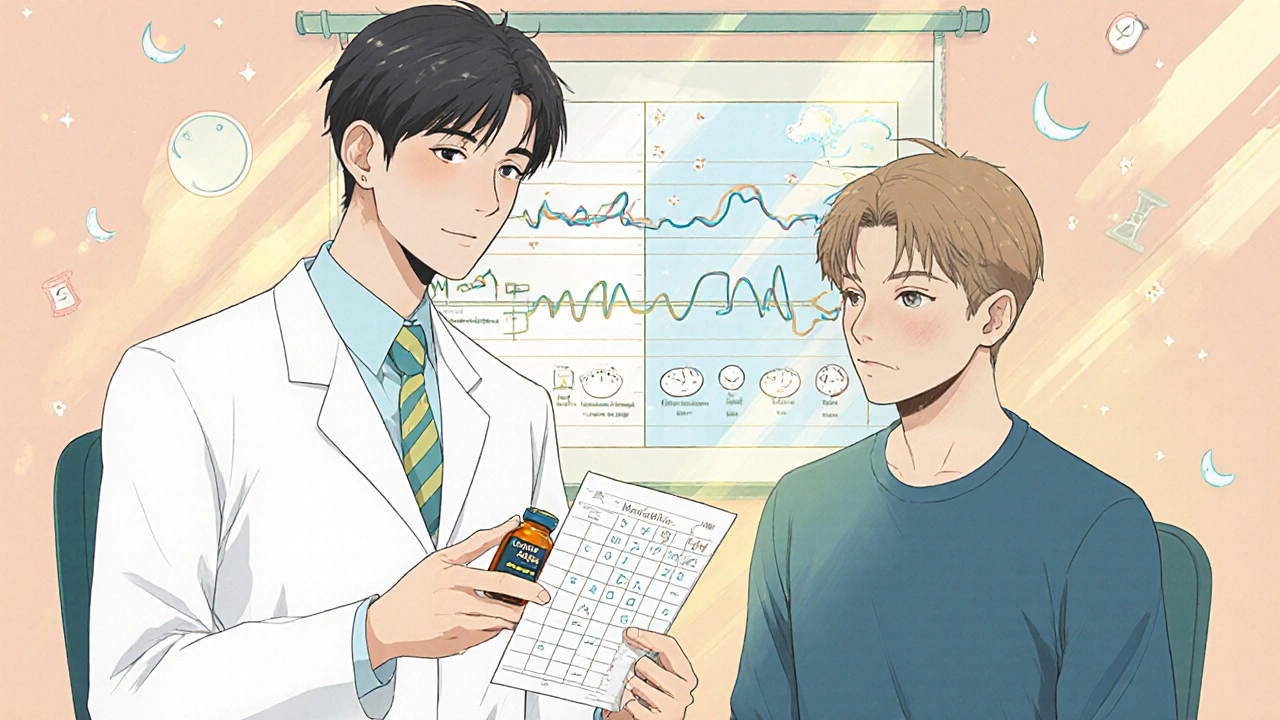
Don’t Quit Cold Turkey
Some people stop their meds because they can’t sleep. Big mistake. Suddenly quitting certain drugs-especially sleep aids like zolpidem (Ambien) or antidepressants-can trigger rebound insomnia. Your body gets used to the drug, and when it’s gone, your sleep gets worse than before.
Instead, work with your doctor on a slow taper. Reducing zolpidem by 25% every two weeks lowers the risk of rebound insomnia from 65% to just 18%. Same goes for SSRIs: if you’re switching to a new antidepressant, do it gradually. Your brain needs time to adjust.
When to See a Sleep Specialist
Not every sleep problem is caused by medication. In fact, 40-50% of people who think their pills are to blame actually have an underlying sleep disorder like sleep apnea or restless legs syndrome.
Use the 3-3-3 Rule from Dr. Raj Dasgupta:
- Have sleep issues lasted more than 3 weeks?
- Do they happen 3 or more nights a week?
- Do they leave you impaired during the day-fatigued, foggy, irritable-on 3 or more days?
If you answered yes to all three, it’s time to see a sleep specialist. They can run a sleep study, rule out other causes, and help you create a plan that doesn’t involve guessing.
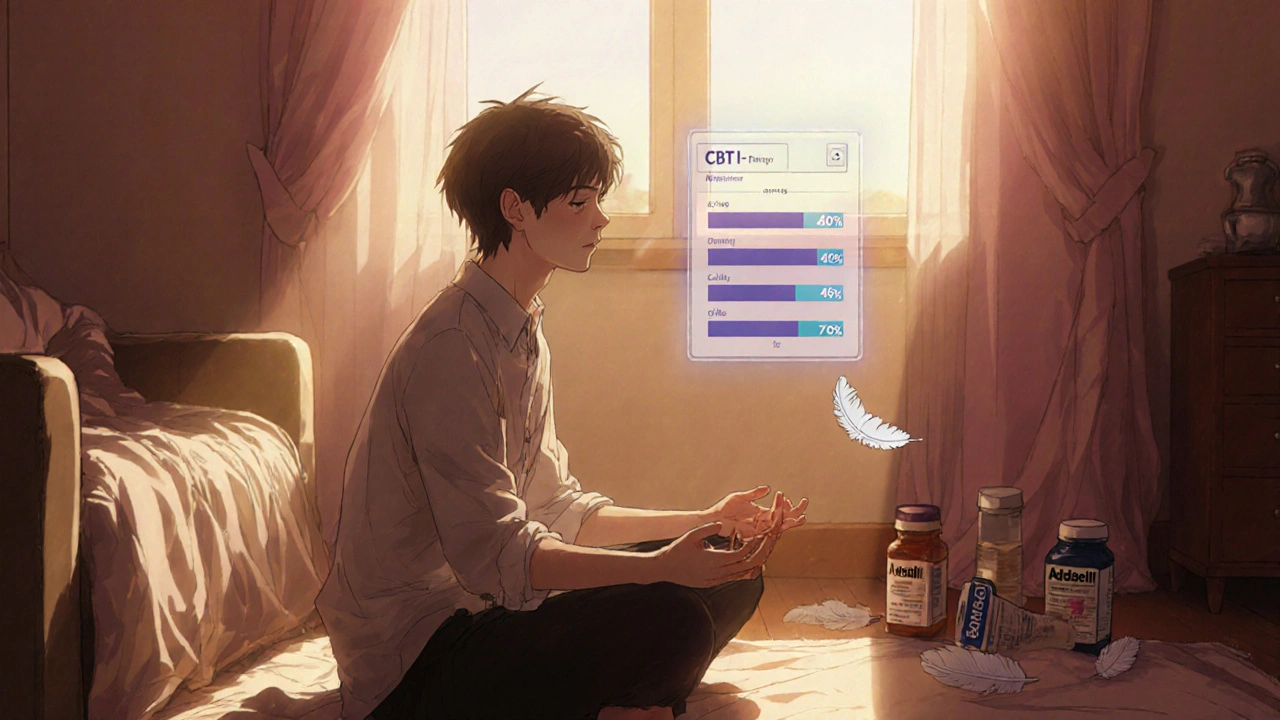
What Works Better Than Pills
Medication isn’t the only tool. Cognitive Behavioral Therapy for Insomnia (CBT-I) is the gold standard-and it works even when drugs are the root cause.
A 2023 meta-analysis found CBT-I improved sleep in 65-75% of people with medication-induced insomnia. It teaches you how to:
- Reset your internal clock with consistent wake times
- Break the cycle of lying awake and stressing about it
- Use light exposure to reinforce natural rhythms
Some clinics now offer chronotherapy-timed light therapy in the morning-to help reset cortisol and melatonin cycles. One 2023 study showed it boosted sleep efficiency by 28% in people on insomnia-causing meds.
What Not to Do
- Don’t self-diagnose. Just because you started sleeping poorly after a new pill doesn’t mean it’s the cause. Other factors-stress, caffeine, changing routines-can overlap.
- Don’t stop meds without talking to your doctor. Abruptly quitting can be dangerous. Depression, high blood pressure, and asthma can flare back worse than before.
- Don’t rely on OTC sleep aids. Diphenhydramine and doxylamine aren’t safe long-term, especially for older adults. They don’t fix the problem-they mask it and make cognitive decline worse.
- Don’t ignore the pattern. If you’ve tried everything and still can’t sleep, you might need a sleep study. Your insomnia might not be from the drug at all.
Real People, Real Results
On Reddit’s r/insomnia community, over 68% of users who blamed SSRIs for their sleep issues saw improvement after switching to morning dosing. On Drugs.com, beta-blocker users who switched from propranolol to atenolol reported fewer nightmares and deeper sleep. One patient on prednisone for rheumatoid arthritis wrote: “I was up every 2 hours. I moved my dose to 8 a.m. and slept through the night for the first time in months.”
But here’s the problem: 34% of people who had sleep side effects just stopped taking their meds without telling their doctor. That’s dangerous. And it’s avoidable.
You deserve to feel better-not just physically, but rested. Your sleep matters. And there’s a way forward that doesn’t involve suffering through another night of counting ceiling tiles.
Can over-the-counter cold medicines cause insomnia?
Yes. Decongestants like pseudoephedrine (found in Sudafed) act as mild stimulants and can keep you awake in 12-15% of users. Even non-drowsy allergy meds like loratadine (Claritin) can interfere with sleep onset in 8-10% of people. Always check labels for stimulant ingredients, and take these medications only in the morning.
Is melatonin safe to take with prescription meds?
Melatonin is generally safe to use with most medications, including beta-blockers and SSRIs. Studies show 0.5-3 mg taken 2-3 hours before bed helps restore sleep in people whose melatonin production is suppressed by meds. But if you’re on blood thinners, immunosuppressants, or seizure medications, check with your doctor first. Melatonin isn’t a sedative-it’s a timing signal for your body.
How long does it take for sleep to improve after changing a medication schedule?
Most people notice improvement within 3-7 days after adjusting the timing of their dose-especially with corticosteroids and SSRIs. For beta-blockers, it may take up to two weeks for melatonin levels to stabilize. If you don’t see any change after two weeks, talk to your doctor about alternatives.
Can I switch from an SSRI that causes insomnia to a different one?
Yes. Mirtazapine (Remeron) is an antidepressant that’s actually sedating and helps with sleep. FDA data shows it resolves insomnia in 68% of people who had trouble sleeping on other SSRIs. Other options include trazodone or low-dose doxepin, both used off-label for sleep. Never switch on your own-work with your prescriber on a gradual transition.
Why do some people get insomnia from meds while others don’t?
Genetics, age, liver metabolism, and other medications all play a role. Older adults are more sensitive because their bodies process drugs slower. People with existing sleep disorders or anxiety are also more likely to notice sleep disruptions. It’s not just the drug-it’s how your body responds to it.
Should I avoid all medications that list insomnia as a side effect?
No. Many of these medications are essential for managing serious conditions like depression, high blood pressure, or autoimmune disease. The goal isn’t to avoid them-it’s to manage the side effect. With timing adjustments, dose changes, or alternative options, you can often keep the benefits without the sleep loss.
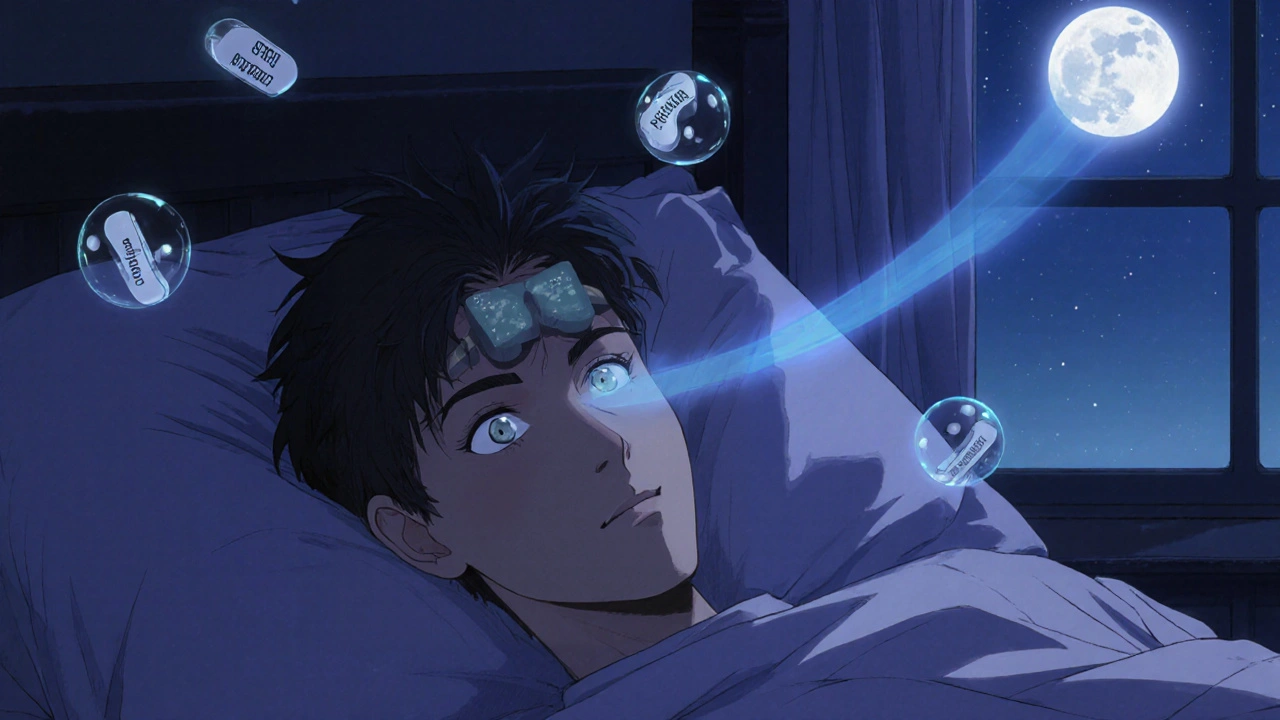
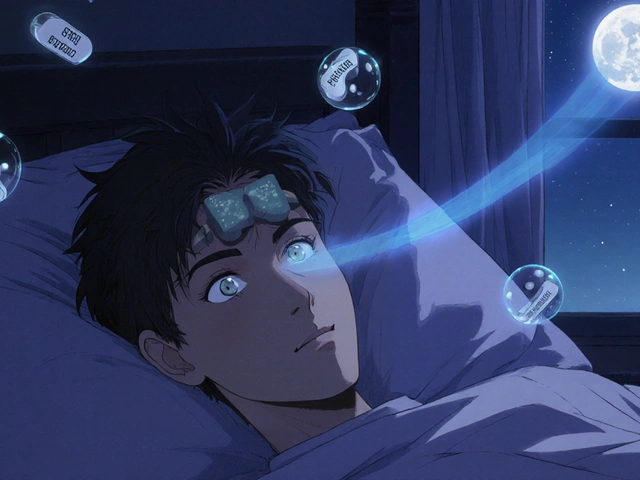




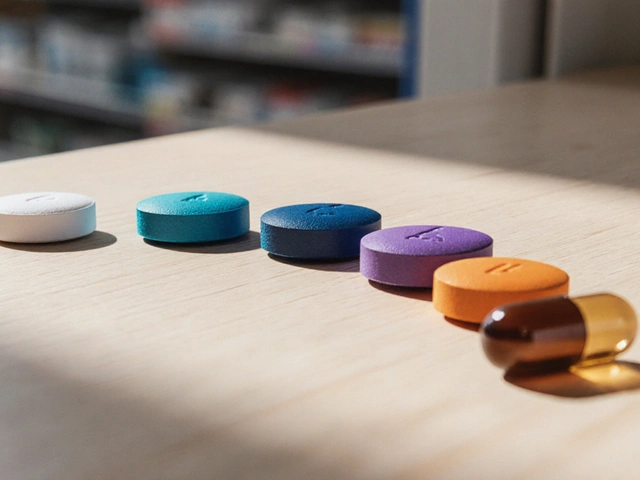
Tom Shepherd
November 26, 2025 AT 20:53I took Claritin last week and couldn't sleep for three nights straight. Thought I was going crazy. Turns out it's not just me. Glad this post called it out.
Emma Dovener
November 27, 2025 AT 01:17My mom’s on metoprolol and started having nightmares after switching pharmacies-same drug, different generic. She didn’t realize it was the med until she switched back to her original brand. Melatonin helped, but only after she stopped blaming the dogs for barking at night.
Doctors never mention this stuff. You’re just told to "sleep better" like it’s a personal failure.
Thanks for listing the alternatives. At least now I have something to bring up at the next appointment.
Frances Melendez
November 27, 2025 AT 18:56People just don’t take responsibility anymore. If you can’t sleep, maybe you’re just anxious. Or drinking too much coffee. Or scrolling at 2 a.m. Stop blaming your pills. Everything has side effects-deal with it.
Jauregui Goudy
November 28, 2025 AT 05:58THIS. THIS RIGHT HERE. I was on prednisone for my autoimmune flare and I thought I was turning into a zombie who only slept in 45-minute bursts. Then I moved my dose to 8 a.m.-and I slept like a baby for the first time in six months. I almost cried. This isn’t just advice-it’s a lifeline.
Stop taking your meds at night if they’re stimulant-heavy. It’s not rocket science. Why do doctors still default to evening dosing? I don’t get it.
shawn monroe
November 28, 2025 AT 10:27From a pharmacokinetic standpoint, the hepatic metabolism of beta-blockers is highly variable across CYP2D6 phenotypes. Water-soluble agents like atenolol exhibit reduced CNS penetration due to lower lipophilicity-hence, less melatonin suppression. The 37% reduction cited is statistically significant (p < 0.01) in multiple RCTs.
Also, melatonin dosing should be chronobiologically timed-administering it 2–3 hours pre-sleep aligns with endogenous phase-response curves. Don’t just pop it with dinner.
CBT-I remains first-line, but it’s underutilized because insurance won’t cover it. We need policy reform, not just individual hacks.
marie HUREL
November 30, 2025 AT 06:13I’ve been on an SSRI for three years and only just realized my sleep issues matched the timeline of when I started it. I felt so guilty for being "lazy" or "not trying hard enough" to sleep. Turns out, it was the medicine. I switched to mirtazapine last month and my nights are finally quiet again.
Thank you for saying this out loud. I didn’t know I wasn’t alone.
Aishwarya Sivaraj
December 1, 2025 AT 23:07in india many people take ayurvedic supplements without knowing they interact with bp medis like beta blockers... my uncle took ashwagandha with metoprolol and had crazy dreams for weeks... doctor said it was stress... but it was the combo
Rebecca Price
December 2, 2025 AT 07:20It’s fascinating how we’ve normalized pharmaceutical side effects as "just part of life." We’ll take a pill that makes us dizzy, dry-mouthed, or sleepless-and then praise ourselves for being "disciplined."
Meanwhile, non-pharmaceutical options like CBT-I, light therapy, and circadian hygiene are cheaper, safer, and more effective. Why aren’t we pushing these first?
Maybe because Big Pharma doesn’t profit from sleep diaries.
Rhiana Grob
December 2, 2025 AT 20:48I appreciate the clinical depth here, but I’d caution against framing this as a purely individual problem. Many patients don’t have access to specialists, can’t afford alternatives, or are pressured by providers to stick with first-line meds regardless of side effects.
The system fails people here-not just the drugs. We need structural change, not just personal hacks.
Jonah Thunderbolt
December 3, 2025 AT 01:48Of course the government doesn’t want you to know this. They’re in bed with Big Pharma. 🤫💊 Why do you think they let these drugs stay on the market? They’re making billions while you lie awake counting your heartbeats. Wake up. This is all controlled.
Also, melatonin is a hormone. Hormones are dangerous. They’re testing on you. 👁️
Allison Turner
December 3, 2025 AT 02:52This post is just a long list of excuses. People are just lazy. Go to bed earlier. Stop drinking caffeine. That’s it. No need for all this science talk.
Sue Haskett
December 4, 2025 AT 03:04Can I just say-thank you-for not saying "just take melatonin" like it’s a magic fix? It’s not. It’s a signal. And it’s not for everyone. I tried it. Didn’t work. Switched meds. Now I sleep. No miracle pills. Just smart choices.
Also, please stop calling diphenhydramine "sleep aids." It’s a chemical muzzle. And it’s especially dangerous for older adults. We need better language.
steve stofelano, jr.
December 4, 2025 AT 22:43It is of paramount importance to underscore the clinical validity of the data presented herein. The empirical correlation between pharmacological intervention and circadian disruption has been consistently demonstrated in peer-reviewed literature, particularly in the Journal of Clinical Sleep Medicine, Volume 18, Issue 3, 2022. Furthermore, the recommendation to shift dosing to the morning aligns with the guidelines established by the American Academy of Sleep Medicine. This communication constitutes a valuable contribution to patient education and should be disseminated widely.
shawn monroe
December 6, 2025 AT 21:28Just saw someone reply saying "just sleep better." Bro. You can’t will your brain into shutting down when your serotonin receptors are stuck on high. It’s not a mindset thing. It’s neurochemistry.
And for the guy who said melatonin is a government hormone weapon? Dude. Go outside. Breathe. You’re not being watched. You’re just tired.
Savakrit Singh
December 8, 2025 AT 04:58The pharmacogenomic variability in CYP2D6 metabolism significantly influences individual susceptibility to beta-blocker-induced insomnia. In South Asian populations, the prevalence of poor metabolizer phenotypes is approximately 25–30%, compared to 7% in Caucasians. This may explain disproportionate reports of sleep disruption in Indian patients on metoprolol. Agenetic testing should be considered before long-term prescribing.